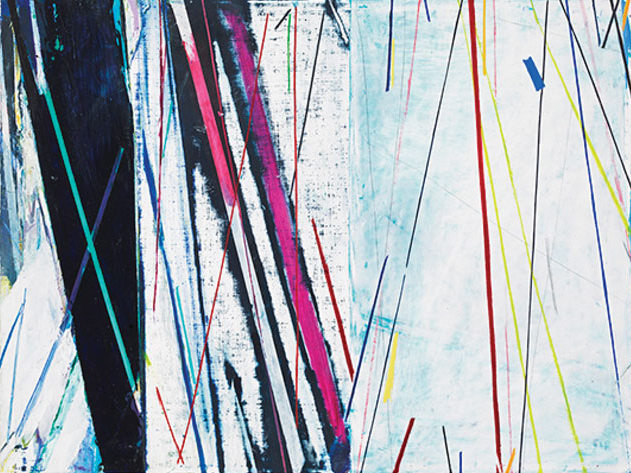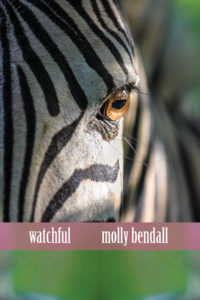
Watchful
Molly Bendall
Omnidawn, $17.95 (paper)
Fed up with a philosophical tradition that failed to think outside the human, Jacques Derrida once admitted, “thinking concerning the animal, if there is such a thing, derives from poetry.” Molly Bendall’s Watchful heeds this call with the urgency of a zoo leopard clawing at a glass wall—and with the guilt-tinged fascination of a paying spectator. “How do we look now / In the roped off area?” is the book’s driving provocation as its speaker confronts the uncanniness of captivity and species difference at the Los Angeles Zoo. Flinchingly inhabiting a human gaze haunted by extinction, capitalism, carceral impulses, and environmental crisis, Bendall’s spare lyricism interrogates the tense but tender kinship between human animals and their strange and estranged cohabiters of an endangered earth. The spectator’s curiosity shimmers in and out of culpability, like flashes of light across animals’ hides: “I’m afraid / I pawed it, then watched the horrible pulse”; “Fur can glare, even hurt.” Her refusal to refer to animals by name sometimes renders the action of these scenes frustratingly inaccessible; but then again, isn’t it humans’ desire to access “the wild” that licenses the fraught spaces that structure these poems? This is a poetics of enclosure, whose short but energized lines pace around a tightly circumscribed area. Reckoning with “the debt that / Hides near / Moss,” Bendall attempts an impossible recompense by honoring the parts of captive life that both embody and exceed confinement. We see with her, with her enthralled fury, that “there’s a zeal // in their hides.”
—Liz Bowen
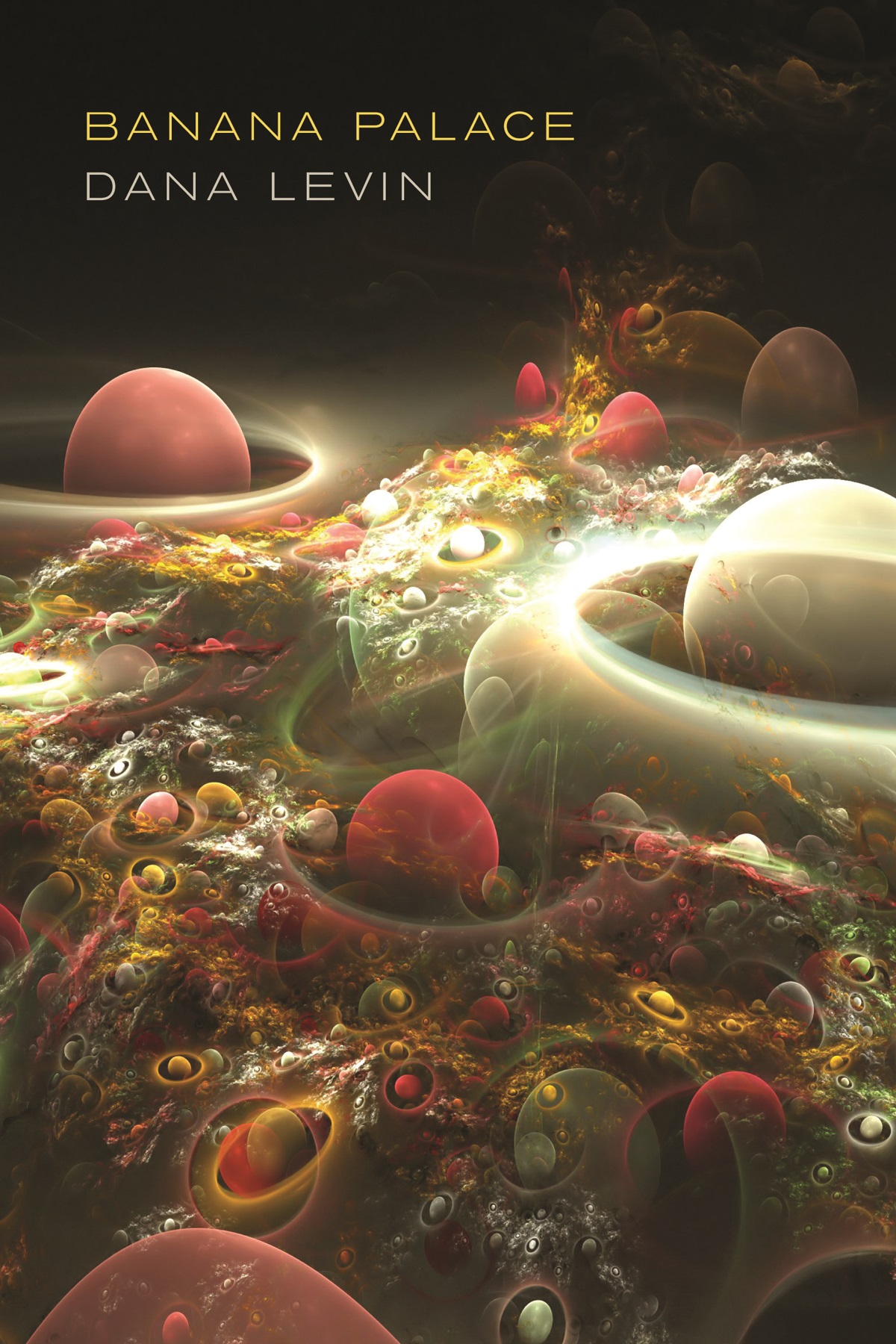
Banana Palace
Dana Levin
Copper Canyon Press, $17 (paper)
Levin explores the byways of our human dooms with a sense of aftermath that is now particularly resonant, as is the doomsday-prepper logic of these poems: “you have to fear the future / more than you used to which sounded like the soul // waving a series of flags at me—.” While the first half of the book explores metaphysical alternatives to the body, technological or supernatural, the latter half tenderly rejects these aims as wishful thinking, projections of an age “blindered” by the simulated urgency of electronic devices and digital networks. Removing the blinders naturally results in some nihilism, yet Levin’s darkness is never humorless. She even compares the Roman epitaph nffnsnc (“I was not, I was, I am not, I don’t care”) with TTFN. While the poems bounce between historical and possible outcomes, the present moment becomes an unusually slippery concept. Like the sibyl she invokes, Levin lets her speculative futures scatter like leaves in the wind, the music of her lines modulating between rustle and howl. In these elegiac warnings, the timeliness of the predictions is intentionally ambiguous—when can we stop expecting something worse? For Levin, these anxieties are symptoms of human optimism, survival instinct, appetite. Echoes of The Waste Land remind us hope is painful and that appreciating the world does not protect it from our daily longings. Italo Calvino put it well: “Desires are already memories.” In the end, Levin recoils from the future with a ferocious gratitude for what remains. As one of her “apocalypticians” says: “Earth is our only time machine.”
—Laura Marris
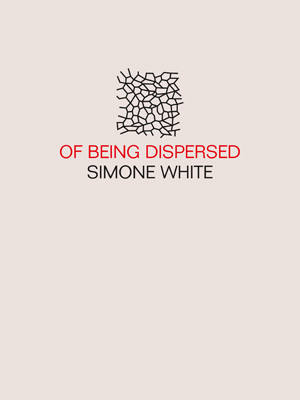
Of Being Dispersed
Simone White
Futurepoem Books, $18 (paper)
In the sequence “Preliminary Notes on Street Attacks,” Simone White interrupts her long poem on racial violence with a meditative ars poetica: “You don’t want to touch anyone or be following some girl around a gallery, then bop her on the head as a blow against racism. The spirit is of lassitude. You are a glazer.” For all that White reveals about black womanhood in this volume of poetry and essays, her focus is on phenomena as such rather than on what generalizations readers should draw from them. Her account of intersectionality owes its intellectual roots not to sociology but to the American modernist poetic canon: she cites George Oppen, Wallace Stevens, Amiri Baraka, Robert Duncan, and Charles Reznikoff. As with so many of these poets, White’s concern is with recalibrating the interactions between the external world and internal sensibilities in order to preserve a full and generative sense of identity that exceeds social roles. Using language to explore the uncertain boundaries around selves, White remarks in a characteristically syncopated and syntactically dense passage “it is a complexity / whether one is being / done for or doing in your element.” Yet the book’s most pronounced appeal might be how White enticingly—even playfully—draws her reader into that internal space. In a surprisingly celebratory essay on body lotion, she describes how black femininity is defined through practices that maintain the façade; but she closes in a different register, demanding “Never doubt that these crevices extend toward an infinitely receding boundary. Come close to me to feel it.”
—Annie Bolotin
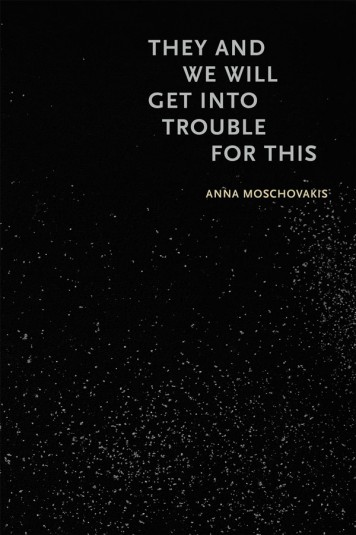
They and We Will Get into Trouble for This
Anna Moschovakis
Coffee House Press, $16.95 (paper)
Since Trump’s election, there is a new and perhaps unfair requirement that poetry address the urgent question of how we should live and speak now. Anna Moschovakis’s They and We Will Get into Trouble for This lives up to this pressure despite having been written before it was applied. The book’s three long poems capture the process of thinking through how to be a person with history, complicit with and against a historicized present. Perhaps what is needed now is what this book supplies: beautiful and fraught complexity. “I don’t know a thing about paradise,” begins the first poem, which then goes on to interrogate that very ideal, to imagine how one can lose a faith one never had to begin with. The second poem intersperses questions from a psychological questionnaire with stories of living on and near the fringes of places, cultures, and health. “My life is pretty full A little of the time,” Moschovakis writes and then turns absence into an engine: “the night Serge Gainsbourg died I heard all of Paris weeping—when I cry I cry for these imperfect things.” In the last poem, spoken to a writer as she is being translated, the intimacy and failures of language cancel each other out into a form of peace. Philosophy, anthropology, linguistics, and other realms of theory are woven throughout the book, which never creates an academic distance, but builds a path toward intimacy. Moschovakis’s collection is “an invitation to || an experimental faith || a humble, vulnerable faith.”
—Jennifer Kronovet
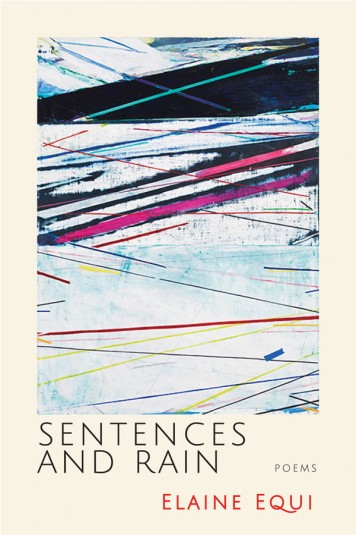
Sentences and Rain
Elaine Equi
Coffee House Press, $16.95 (paper)
Equi asks how a poet can engage with the sublime while still living in the world: “Can I witness the Rapture / and still make it home in time for dinner?” Looking at contemporary American society through a sly and compassionate lens, Equi balances humor and reflection, drawing her inspiration from lipstick shades, umbrellas, ladies who lunch, and William Carlos Williams. Her short, tight lines enhance tensions between the poetic and the ordinary, and her poems celebrate contradiction: “I do yoga / while watching TV // but then I get interested / in what the guests / on talk shows are saying.” The poems in this collection are mainly couplets or short stanzas, rarely going over one page. Equi’s spare, precise forms seem to force the words to stretch to fill the empty spaces on the page and in the reader’s mind, allowing complex images to unfold: “I’ll know my country / when I seize it— // like Columbus on the way / to someplace else—” Equi invites the reader to join her in spaces where the surreal becomes commonplace, where reality gives way to magical realism: “Just thinking of it gives my brain a wedgie. / Seems like one thing is always in the process // of overtaking another even if they both move slower / than the decline of the Roman Empire.” In these liminal spaces, she suggests there is both/and, reality and magic, and the reader does not have to choose either/or.
—Catherine Fahey
